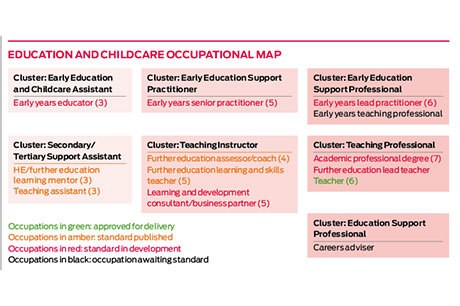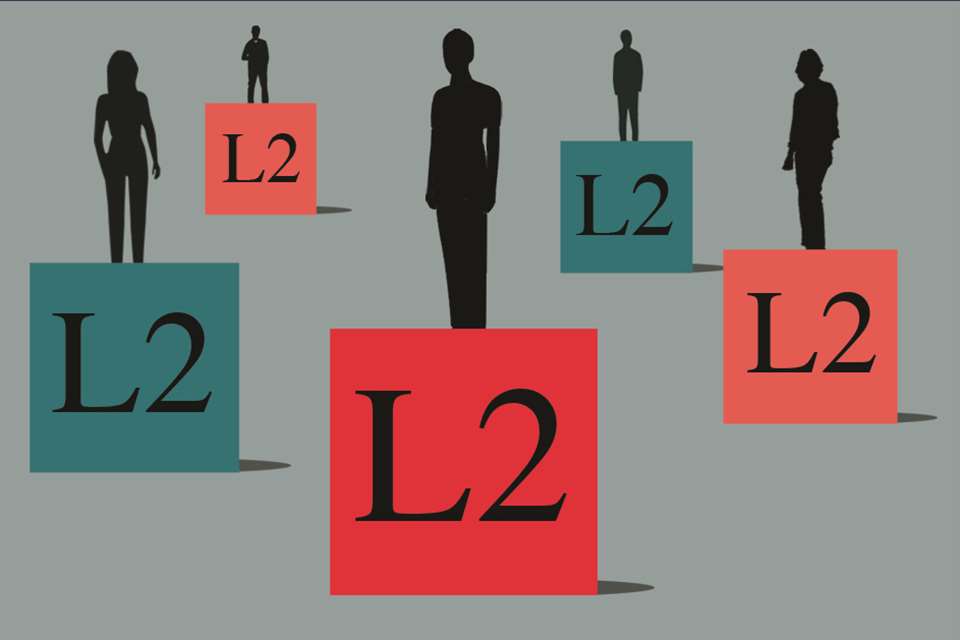Workforce Strategy, Part 7: The Skills Mix - Off the map
Charlotte Goddard
Monday, February 5, 2018
The Government’s ‘education and childcare occupational map’ has caused some confusion and controversy. Charlotte Goddard investigates what the new qualifications and training will be

Variety is the spice of life, and the early years is no exception – Forest School, entrepreneurship, supporting special needs children, childminding, or even exporting your brand to China, are all valuable skills in this sector. And while there is a plethora of settings, there is also no consistency over job titles: early years teacher, for example, might require Qualified Teacher Status, Early Years Teacher Status or simply a Level 3.
As Professor Cathy Nutbrown wrote in 2012 in her qualifications review, there is a need to ensure ‘that early years staff have clear and intelligible roles, responsibilities and status, which are understood and adopted across the sector’.
In 2016 the Government took the baton and started a radical plan to reduce the number of qualifications available: The Skills Plan. The need for this was spelled out in the Early Years Workforce Strategy, published in April last year: ‘We need to ensure there are clear opportunities for career progression, which are accessible and result in professional and/or financial benefits.’
OCCUPATIONAL MAP
This has developed into a ‘map’ for education and childcare career progression, one of 15 sector occupational maps. These will be used as the basis to reorganise and streamline vocational qualifications, and develop T levels. The Institute for Apprenticeships (IfA), which has taken ownership of the project, ran a consultation on the maps, ending last month.
The map categorises occupations in different clusters: technical, higher technical, and professional, starting with the ‘technical’ Early Education and Childcare Assistant cluster at Level 3, which includes the role of Early Years Educator, moving on to the Early Years Education Support Practitioner and finishing with Early Years Education Support Professional. ‘The pathways are intended to show likely career progression, and often you can see the natural progression between occupations at different levels within the same pathway,’ says an Institute for Apprenticeships spokesperson. ‘However, this is only meant to be a guide and individuals shouldn’t be deterred from seeking opportunities in different pathways if they can meet any relevant entry requirements.’
MISLEADING TERMS
There has been confusion over the terminology, though – Level 3 roles are referred to as ‘assistants’. ‘Assistant is the wrong terminology in our sector,’ says CACHE associate director Julie Hyde. ‘There is a consultation around Level 2 qualifications taking place which talks about early years assistants, so the Government can’t then say early years assistant is a Level 3.’
The map also does not reflect the diversity of roles highlighted in the workforce strategy. Mark Dawe, chief executive of the Association of Employment and Learning Providers, says, ‘Initially the maps seem to set out roles in such a way that you see the pathways through, but when you look at the detail it seems there are big gaps. It feels like there has not been enough linking to sector organisations to say “define what it is your sector needs at each level”.’
The IfA says the maps will evolve as employers develop new proposals for apprenticeships and further skills gaps are identified. ‘The Early Years Educator is the only occupation identified for the first cluster, but any other skilled early years occupations at Levels 2/3 would be added to that cluster,’ says a spokesman.
T LEVELS
Under the Skills Plan, published in 2016, young people wanting to work in early years will be able to choose an academic or technical route after GCSEs. The academic route is A levels, while the technical route is either a new technical programme – T level – or a work-based apprenticeship. T levels have qualifications within them, and most of these will be new, though Early Years Educator will be retained at Level 3. T levels are classroom-based (with work experience) and aimed at those who want a broad qualification which will allow them to specialise later on. A consultation on the development of T levels closes on 8 February.
T levels will replace technical certificates and diplomas, says Ms Hyde, adding, ‘There will be fundamentally fewer qualifications out for delivery in the technical space, but just as many in apprenticeships’.
While a wide range of colleges and post-16 providers will eventually deliver T levels, the qualification within the T level programme will only be offered by one qualifications provider, appointed following a competitive tender. The Government expects the tendering process to commence this summer for T levels intended for teaching in 2020 – and education and childcare is included. ‘T levels are likely be formed around pathways, so there is likely to be one T level covering education and childcare,’ says the IfA spokesperson. ‘Individuals will study core content which covers knowledge and skills common to that pathway, then choose an occupation within that pathway to specialise in.’
However, ‘there is the anxiety that young people could start what they think will allow them to get a job, then find they have to go and do an apprenticeship as well,’ says Ms Hyde.
‘One big issue that will need resolving is if you are doing Level 3 T levels, will this enable you to progress to Level 4 apprenticeship? Some providers are saying they would not accept Level 3 T levels for a Level 4 apprenticeship – if that is the case, why would someone do T levels?’ says Mr Dawe.
TWO PANELS
The content of the sector’s T level is being thrashed out by a 14-member education and childcare panel of stakeholders appointed at the end of last year and chaired by Ed Sallis, chair of the English and maths advisory board of Mid Kent College. It sits under the DfE and will use the approved apprenticeship standards as a basis for outline content of T level programmes. Their work is being overseen by another group, also called the education and childcare route panel, which sits under the IfA. Chaired by Sir Nick Weller, chief executive of the Dixons Academies Trust, its other members hail from schools and universities. It oversees the management of standards, qualifications and occupational maps for the education and childcare route, for both apprenticeships and T levels.
Colleges and post-16 providers in Sheffield are among those that are being supported to become ‘routes ready’, in a two-year project funded by the Gatsby Foundation and run by Sheffield City Region. Krysia Woofinden, senior programme manager for the Combined Authority and Local Enterprise Partnership, is leading the project. ‘We are supporting providers to look at the employer engagement angle, how they can flip their model to fulfil the work placement element,’ she explains. ‘We are also supporting colleges to map the qualifications they offer now to the occupation maps, to evaluate where the curriculum is at the moment, where changes need to take place, and where there are gaps.’ The third strand of the work is around providing advice and guidance to students about what T levels are and how they link into apprenticeships. ‘The message is technical qualifications have parity with academic qualifications,’ she says.
We are still in the early stages, says Mr Dawe. ‘The timeline is incredibly tight – we are only consulting on the broad principles at the moment. Someone has to set the curriculums, then there will be a tender; whoever wins has to develop the qualification [in some cases] then expect time to allow tutors to prepare.’







